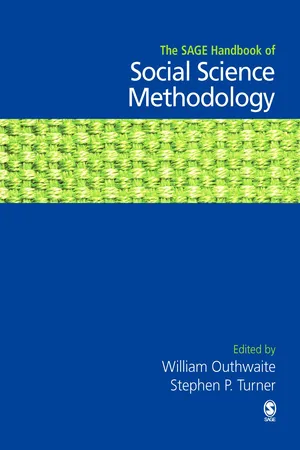
The SAGE Handbook of Social Science Methodology
- 640 pages
- English
- PDF
- Available on iOS & Android
The SAGE Handbook of Social Science Methodology
About this book
- Roger Jowell, City University
"In this wide-ranging collection of chapters, written by acknowledged experts in their fields, Outhwaite and Turner have brought together material in one volume which will provide an extremely important platform for consideration of the full range of contemporary analytical and methodological issues."
- Charles Crothers, Auckland University of Technology
This is a jewel among methods Handbooks, bringing together a formidable collection of international contributors to comment on every aspect of the various central issues, complications and controversies in the core methodological traditions. It is designed to meet the needs of those disciplinary and nondisciplinary problem-oriented social inquirers for a comprehensive overview of the methodological literature. The text is divided into 7 sections:
- Overviews of methodological approaches in the social sciences
- Cases, comparisons and theory
- Quantification and experiment
- Rationality, complexity and collectivity
- Interpretation, critique and postmodernity
- Discourse construction
- Engagement.
Edited by two leading figures in the field, the Handbook is a landmark work in the field of research methods. More than just a ?cookbook? that teaches readers how to master techniques, it will give social scientists in all disciplines an appreciation for the full range of methodological debates today, from the quantitative to the qualitative, giving them deeper and sharpen insights into their own research questions. It will generate debate, solutions and a series of questions for researchers to exploit and develop in their research and teaching.
Frequently asked questions
- Essential is ideal for learners and professionals who enjoy exploring a wide range of subjects. Access the Essential Library with 800,000+ trusted titles and best-sellers across business, personal growth, and the humanities. Includes unlimited reading time and Standard Read Aloud voice.
- Complete: Perfect for advanced learners and researchers needing full, unrestricted access. Unlock 1.4M+ books across hundreds of subjects, including academic and specialized titles. The Complete Plan also includes advanced features like Premium Read Aloud and Research Assistant.
Please note we cannot support devices running on iOS 13 and Android 7 or earlier. Learn more about using the app.
Information
Table of contents
- Contents
- Notes on Contributors
- General Introduction
- SECTION I Overviews
- Introduction
- 1 The Social Sciences Since World War II: The Rise and Fall of Scientism
- 2 Interdisciplinary Approaches in Social Science Research
- SECTION II Cases, Comparisons, and Theory
- Introduction
- 3 Ethnography
- 4 Comparative Methods
- 5 Historicity and Sociohistorical Research
- 6 Case Study
- SECTION III Quantification and Experiment
- Introduction
- 7 Statistical Models for Causation
- 8 Fighting to Understand the World Causally: Three Battles Connected to the Causal Implications of Structural Equation Models
- 9 Experimental and Quasi-Experimental Designs in Behavioral Research: On Context, Crud, and Convergence
- 10 Theory and Experimentation in the Social Sciences
- 11 The Treatment of Missing Data
- 12 Modeling Selection Effects
- 13 Methods for Census 2000 and Statistical Adjustments
- 14 Quantitative History
- SECTION IV Rationality, Complexity, Collectivity
- Introduction
- 15 Rational Choice Theory
- 16 Rationality and Rationalist Approaches in the Social Sciences
- 17 Individual and Collective Agency
- 18 Simulating Complexity
- 19 Evolutionary Approaches in the Social Sciences
- SECTION V Interpretation, Critique, and Postmodernity
- Introduction
- 20 Understanding and Interpretation
- 21 New Controversies in Phenomenology: Between Ethnography and Discourse
- 22 Liberal Humanism and the European Critical Tradition
- 23 Grounded Theory: Critiques, Debates, and Situational Analysis
- 24 Does Postmodernism Make You Mad? Or, Did You Flunk Statistics?
- SECTION VI Discourse Construction
- Introduction
- 25 Social Construction and Research Methodology
- 26 Rhetorics of Social Science: Sociality in Writing and Inquiry
- 27 Discourse Analysis
- SECTION VII Evaluation, Engagement, and Collaborative Research
- Introduction
- 28 Evaluation Research
- 29 Feminist Methodology
- 30 Feminist Methodology and Its Discontents
- 31 Community-Based Research
- 32 Qualitative Methodology (Including Focus Groups)
- 33 Making a Mess with Method
- Index